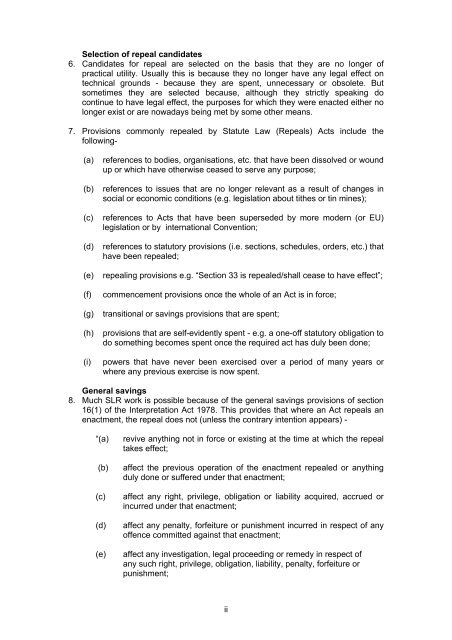Poor Relief - Law Commission
Poor Relief - Law Commission
Poor Relief - Law Commission
You also want an ePaper? Increase the reach of your titles
YUMPU automatically turns print PDFs into web optimized ePapers that Google loves.
Selection of repeal candidates<br />
6. Candidates for repeal are selected on the basis that they are no longer of<br />
practical utility. Usually this is because they no longer have any legal effect on<br />
technical grounds - because they are spent, unnecessary or obsolete. But<br />
sometimes they are selected because, although they strictly speaking do<br />
continue to have legal effect, the purposes for which they were enacted either no<br />
longer exist or are nowadays being met by some other means.<br />
7. Provisions commonly repealed by Statute <strong>Law</strong> (Repeals) Acts include the<br />
following-<br />
(a) references to bodies, organisations, etc. that have been dissolved or wound<br />
up or which have otherwise ceased to serve any purpose;<br />
(b) references to issues that are no longer relevant as a result of changes in<br />
social or economic conditions (e.g. legislation about tithes or tin mines);<br />
(c) references to Acts that have been superseded by more modern (or EU)<br />
legislation or by international Convention;<br />
(d) references to statutory provisions (i.e. sections, schedules, orders, etc.) that<br />
have been repealed;<br />
(e) repealing provisions e.g. “Section 33 is repealed/shall cease to have effect”;<br />
(f) commencement provisions once the whole of an Act is in force;<br />
(g) transitional or savings provisions that are spent;<br />
(h) provisions that are self-evidently spent - e.g. a one-off statutory obligation to<br />
do something becomes spent once the required act has duly been done;<br />
(i) powers that have never been exercised over a period of many years or<br />
where any previous exercise is now spent.<br />
General savings<br />
8. Much SLR work is possible because of the general savings provisions of section<br />
16(1) of the Interpretation Act 1978. This provides that where an Act repeals an<br />
enactment, the repeal does not (unless the contrary intention appears) -<br />
“(a) revive anything not in force or existing at the time at which the repeal<br />
takes effect;<br />
(b) affect the previous operation of the enactment repealed or anything<br />
duly done or suffered under that enactment;<br />
(c) affect any right, privilege, obligation or liability acquired, accrued or<br />
incurred under that enactment;<br />
(d) affect any penalty, forfeiture or punishment incurred in respect of any<br />
offence committed against that enactment;<br />
(e) affect any investigation, legal proceeding or remedy in respect of<br />
any such right, privilege, obligation, liability, penalty, forfeiture or<br />
punishment;<br />
ii
















